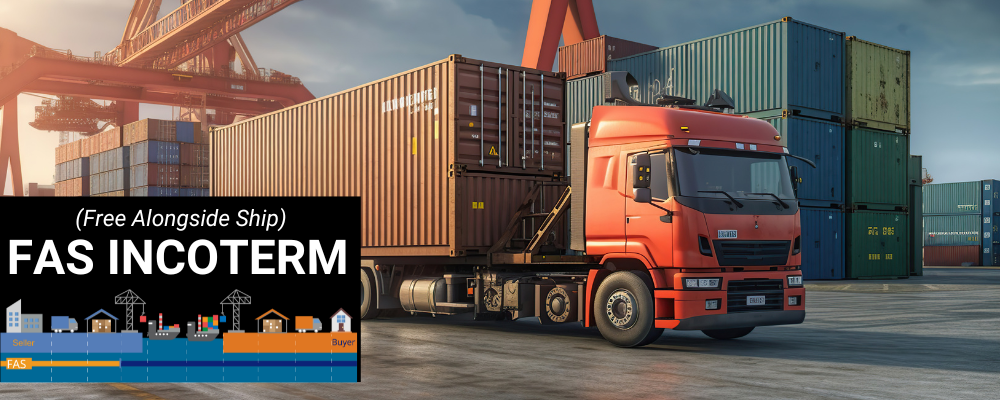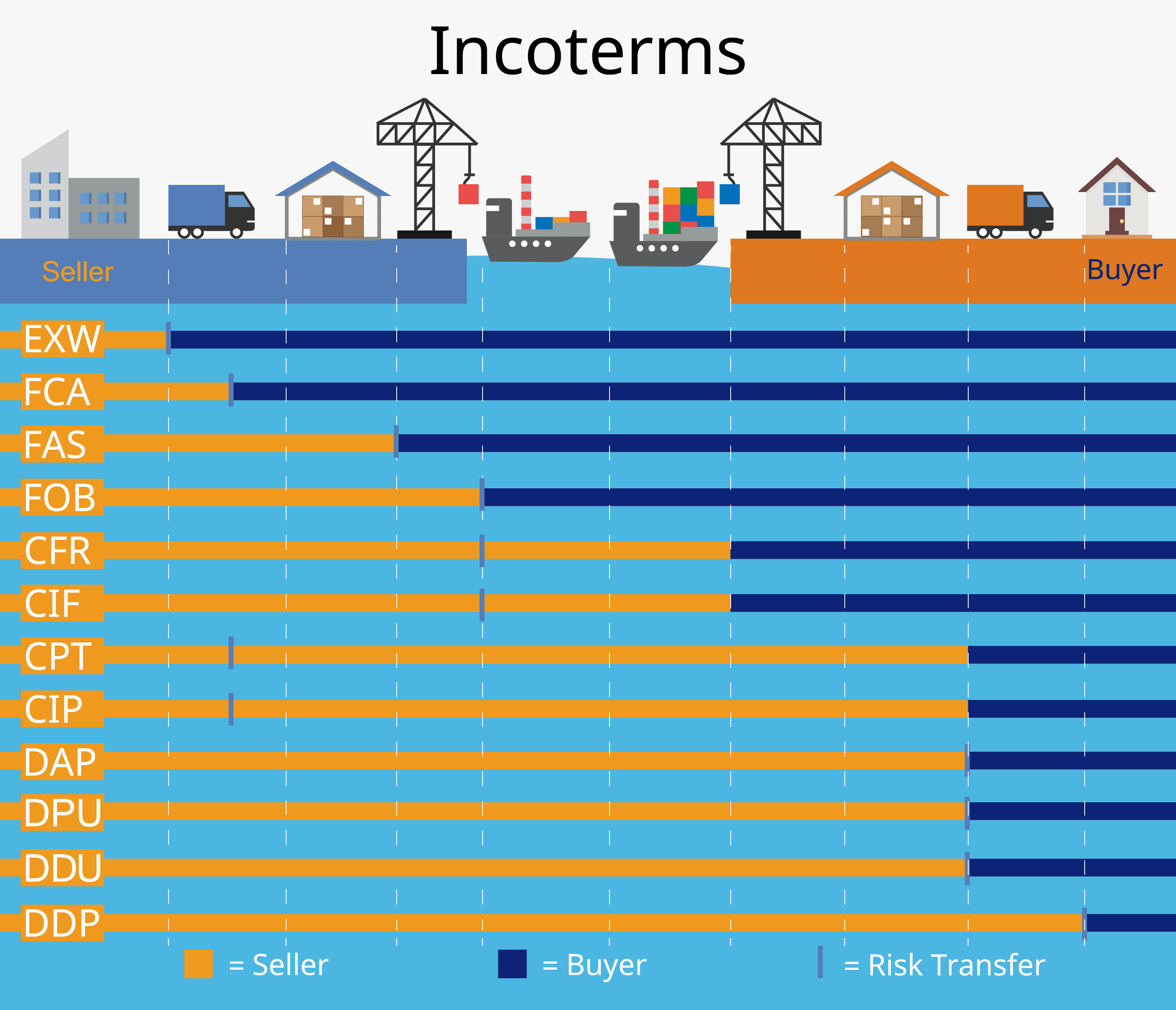
Looking to understand the ins and outs of international trade? Then you’ve come to the right place! In this blog post, we’ll be diving into the world of Incoterms, specifically focusing on one important term: FAS Incoterm (Free Alongside Ship).
Whether you’re a buyer or a seller, understanding the obligations and implications of FAS can greatly impact your import-export activities. So let’s get started and unravel what FAS Incoterm is all about!
What is the FAS Incoterm (Free Alongside Ship)
FAS Incoterm, also known as Free Alongside Ship, is one of the internationally recognized trade terms that define the responsibilities and obligations of buyers and sellers in international transactions. It specifically applies to maritime shipments where goods are delivered alongside a vessel at a specified port.
Under FAS, the seller’s primary obligation is to deliver the goods alongside the ship nominated by the buyer at the agreed-upon port of shipment. This means that once the goods are placed within reach of loading onto the vessel, their responsibility ends. The seller must ensure that proper documentation and customs formalities are completed for export purposes.
On the other hand, buyers have certain obligations when it comes to FAS Incoterm. They must bear all costs and risks associated with transporting goods from this point forward. This includes arranging transportation to their destination, obtaining insurance coverage if necessary, and undergoing any applicable customs procedures or import duties.
It’s important to note that FAS Incoterm may not be suitable for containerized cargo due to its requirement for physical delivery alongside the ship. Containers typically require loading onto vessels using cranes or other specialized equipment rather than being physically placed next to them on a wharf or quay.
Understanding what FAS Incoterm entails is crucial for both buyers and sellers engaged in international trade. By clarifying who bears which responsibilities during shipping processes, this term helps mitigate potential misunderstandings or disputes between parties involved in maritime shipments. So now that we’ve covered what FAS Incoterm means let’s move on to exploring specific obligations under this trade term!
Seller’s obligations under the FAS Incoterm
Seller’s obligations under the FAS Incoterm can be summarized as ensuring the goods are delivered alongside the ship at the named port of shipment. This means that the seller is responsible for all costs and risks associated with delivering the goods to this point.
The seller must package and label the goods in accordance with any agreed-upon specifications or requirements. This includes ensuring proper packaging materials are used to protect the goods during transportation.
It is also incumbent upon the seller to arrange for transportation of the goods from their place of origin to a designated location alongside the ship at the specified port. This involves coordinating with carriers and logistics providers to ensure timely delivery.
Customs clearance procedures fall within a seller’s responsibility under FAS. It is crucial that all necessary documents, such as export licenses or permits, are obtained and provided to facilitate smooth customs processes at both ends of shipment.
Furthermore, sellers must handle any required export documentation accurately and promptly. These may include commercial invoices, packing lists, certificates of origin, insurance certificates (if applicable), transport documents like bills of lading or airway bills as well as any other relevant documentation required by authorities involved in international trade operations.
Moreover, sellers should procure suitable cargo insurance coverage unless otherwise agreed upon between buyer and seller beforehand. While not mandatory under FAS Incoterm rules per se – it might be necessary if there’s an agreement between parties considering potential risks before handing off responsibilities at this stage.
Sellers have an obligation to provide buyers with sufficient notice regarding when and where delivery will take place so that they can make appropriate arrangements for receiving these items without delay on arrival day! Open communication channels help eliminate confusion while promoting transparency between trading partners throughout transaction completion process too!
Buyer’s obligations under the FAS Incoterm
Buyer’s obligations under the FAS Incoterm may vary depending on the specific terms agreed upon in the contract. However, there are some general responsibilities that buyers should be aware of when using this trade term.
It is crucial for buyers to ensure that they have a valid and accurate shipping instruction in place. This includes providing all necessary details such as the name of the vessel, port of loading, and delivery date. Failure to do so could result in delays or additional costs.
Buyers must arrange for transportation from the named port of shipment to their desired destination. This typically involves hiring a freight forwarder or logistics provider to handle the movement of goods. It is important to choose a reliable partner who can efficiently manage the transportation process.
Additionally, buyers are responsible for obtaining any necessary documentation required for customs clearance and export compliance. This may include obtaining export licenses or permits if applicable. Buyers should also ensure that all relevant paperwork such as commercial invoices, packing lists, and certificates of origin are accurately prepared and provided to customs authorities as needed.
Furthermore, buyers need to be proactive in monitoring the progress of their shipment. They should stay in close communication with their seller and shipping agent throughout the entire process to track their cargo’s status and address any potential issues promptly.
Moreover, it is essential for buyers to inspect goods upon arrival at the named port alongside ship location. This inspection aims at verifying that quantity matches what was agreed upon in the contract as well as assessing product quality before accepting delivery.
Once goods have been delivered alongside ship , buyer becomes fully liable towards risks related theft, damage or loss . Therefore , appropriate insurance coverage should be arranged by buyer .
FAS unsuited for containerized cargo
FAS Incoterm, also known as Free Alongside Ship, is a commonly used trade term in international shipping. It defines the obligations and responsibilities of both the buyer and the seller during the transportation of goods.
Under FAS, the seller’s main obligation is to deliver the goods alongside an identified vessel at a specified port. This means that they are responsible for all costs and risks up until that point. They must ensure that the goods are properly packed, labeled, and ready for loading onto the ship.
On the other hand, under FAS, the buyer’s primary obligation is to arrange for transportation from alongside the ship once it has been delivered by the seller. They are responsible for all costs and risks from that point onwards. This includes arranging for customs clearance, freight forwarding services, and any necessary documentation.
While FAS can be an effective Incoterm in many situations, it may not be suitable for containerized cargo. Containers require specialized handling equipment such as cranes or forklifts to load them onto ships or trucks. Since FAS only requires delivery alongside a vessel without specifying any further requirements regarding loading containers onto ships or trucks directly into containerships’ holds; it may pose challenges when dealing with containerized cargo.
Containerization has become a popular method of shipping due to its convenience and efficiency in transporting large quantities of goods securely. However, because FAS does not address these specific requirements associated with container transport logistics explicitly; it may lead to confusion or additional costs if using this Incoterm for containerized cargo shipments.









